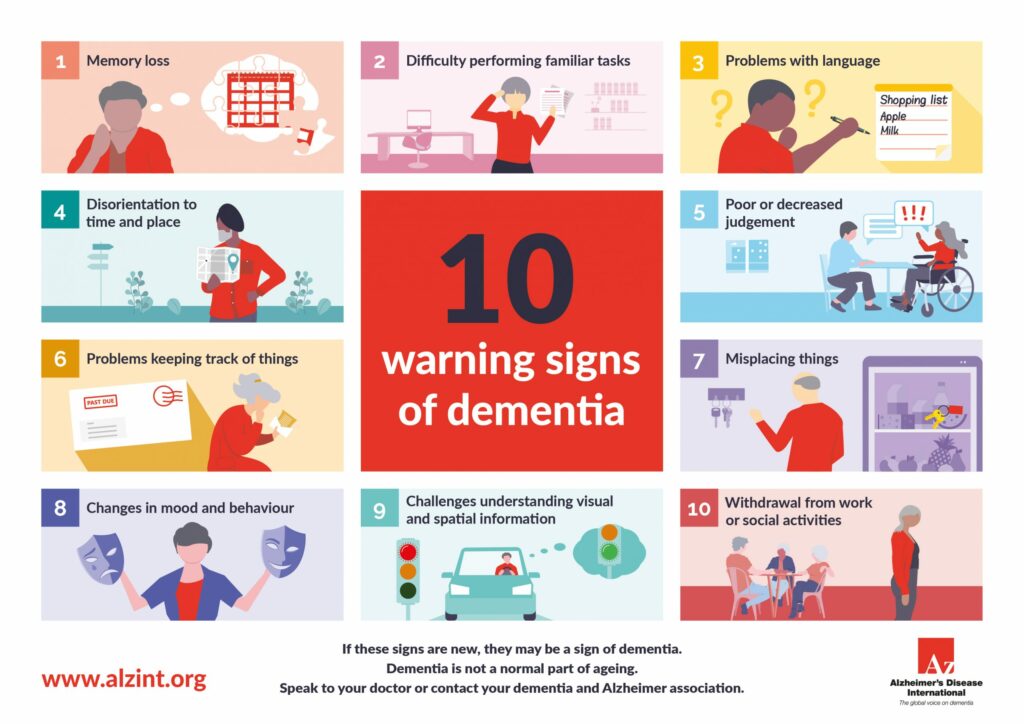Just Ask: Everyday Memory Lapses: What’s Normal as We Age?
Hayley Toth | Sunshine Coast Resource Centre
Have you ever misplaced your keys, blanked on a name, or forgotten an appointment? Mistakes like these happen to nearly all of us and are part of everyday life. As people get older, it’s normal for memory, thinking, and brain function to change. These age-associated cognitive changes can make it harder to recall names, multi-task, or remember details immediately. As we age, understanding what’s typical helps people, families, and caregivers distinguish minor lapses from changes that might need attention.
Last week marked World Alzheimer’s Day (Sept. 21st), a time to raise awareness of Alzheimer’s disease and other forms of dementia—and to challenge the stigma that can make people afraid to seek help. By learning the 10 early warning signs of dementia, we can better spot when memory or thinking problems go beyond normal aging, promote early assessment, and support dignity rather than judgment.
- Memory changes – Repeatedly forgetting new information or asking the same questions.
- Difficulty with familiar tasks – Struggling with everyday activities like cooking, using appliances, or managing chores.
- Problems with language – Forgetting simple words, using wrong words, or substituting vague phrases.
- Disorientation – Getting lost in familiar places or losing track of time, day, or date.
- Impaired judgment – Making unsafe decisions, ignoring medical issues, or inappropriate spending or dressing.
- Problems with abstract thinking – Difficulty with numbers, balancing a cheque book, or understanding symbols.
- Misplacing items – Putting objects in unusual places or being unable to retrace steps.
- Mood or personality changes – Marked irritability, suspicion, withdrawal, anxiety, or unexplained mood swings.
- Loss of initiative – Reduced interest in hobbies, socializing, or starting tasks without prompting.
- Visual or spatial challenges – Trouble judging distances, recognizing objects or faces, or misjudging steps.
Seeing one warning sign does not mean someone has dementia. Signs become concerning when multiple ones appear, especially if they are new, persistent, or progressing and only a qualified healthcare provider can make a diagnosis. Starting a conversation might include documenting which signs have changed and when, asking family/friends whether they’ve noticed differences, and bringing concerns to a physician. The earlier changes are flagged, the more time there is to plan supports and adopt lifestyle strategies that may slow progression or enhance quality of life.
Last year, the Sunshine Coast Resource Centre took part in a project with the Gibsons Seniors Society and UBC called the Building Capacity Project, whose mission is to empower individuals living with cognitive changes to actively engage in community life as respected and valued social citizens. For more information, check our website (resourcecentre.ca) for local resources, including a reading list on brain health provided by the Gibsons Public Library.
The Alzheimer Society of BC offers online webinars and occasionally in-person workshops on the Sunshine Coast (alzheimer.ca/bc/en). If you have questions about Alzheimer’s disease or dementia, you can contact the First Link® Dementia Helpline by calling toll-free at 1-800-936-6033 (Monday to Friday, 9 a.m. to 8 p.m.) or by emailing info@alzheimerbc.org. For general health questions or concerns, including cognitive changes, you can also call HealthLink BC at 8-1-1, where you can access health information, advice, and connections to healthcare professionals.

